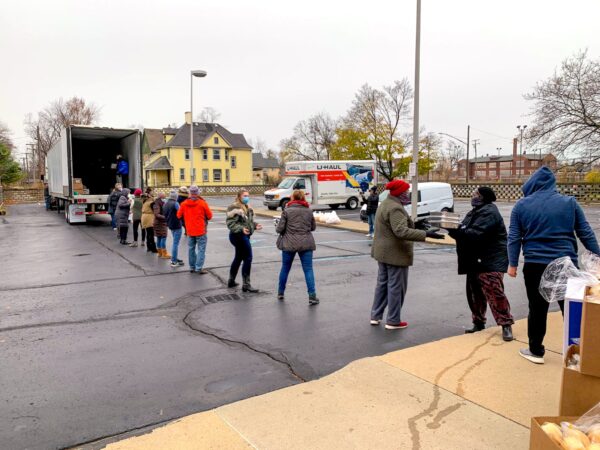Americans throw away 40% of the food we grow, and most of that waste occurs in our homes and consumer-facing businesses including restaurants. Households make up 37% of wasted food and consumer-facing businesses account for 28%.
The food that ends up in landfills decomposes, releasing carbon dioxide and methane, and this food waste is currently contributing 8 percent of total global greenhouse gas emissions.
It’s a big problem.
So what are Detroit area restaurants and communities doing about it?
Actually, a lot.
One organization that’s creating an actionable impact is Make Food Not Waste. Founded in 2017 by Danielle Todd, Make Food Not Waste is at heart an environmental organization whose impetus is twofold… first to prevent food from going into landfills to help save the climate, and second to make use of this food by feeding people who need it.
They are making great strides in both.
With the original mission of teaching the community about sustainable food practices to reduce the amount of waste, MFNW hosted two community feasts in 2018 and 2019. Welcoming over 2,500 and 3,500 people respectively, the events were a way for people to sample dishes made by chefs – from the likes of Mabel Gray, Selden Standard, Lady of the House, and more – from food that would have gone into landfills.

MFNW COMMUNITY FEAST 2019
From the start, the organization has worked alongside Food Rescue US – Detroit to collect food from area restaurants, farmers, and stores that would otherwise have gone to waste and disseminate it to those in need.
Says Darraugh Collins, site director for Food Rescue U.S. – Detroit, “Even one meal that may have otherwise not been had makes a difference,”
In 2021 MFNW opened its Upcycling Kitchen, run by renowned chef, Ederique Goudia.
“With our partners, we work to serve nutritious complete meals to over 1,000 community members weekly, and also host a food pantry with fresh produce, pantry items, dairy, eggs, and more using food that would otherwise be discarded,” said Kate Morgan, Communications Manager of Make Food Not Waste.
To date, they have upcycled 39,000 pounds of food and served over 60,000 free meals to the community out of Jefferson Avenue Presbyterian Church.
This year, through a grant from the Environmental Protection Agency, MFNW has brought an international third-party certification program and launched The PLEDGE on Food Waste in Detroit. This program instructs restaurants, hotels, and other food service businesses in tactics to reduce food waste.

ANSWERING QUESTIONS FROM OMAR ANANI AT PLEDGE TRAINING
In partnership with Food Rescue U.S. – Detroit, Make Food Not Waste is the first organization in the US to offer this program, putting the city at the forefront of sustainability in the food service industry.
“We work to run a zero-waste kitchen, and putting these protocols in place helps us measure potential waste and mitigate it, which is extremely important to us, to the community, and the climate,” said Omar Anani, owner of Moroccan bistro, Saffron De Twah, located on the East side of Detroit.
Along with Saffron De Twah, 20 Detroit-area food purveyors have joined The PLEDGE and Todd aims to increase this to 30+ by the end of the summer.
Restaurants involved, pledge to shrink their carbon footprint, cut food costs, build their brand, and give back to the community.
“Anyone who utilizes resources has a responsibility to replenish them, and restaurants use a lot of resources,” said Stephanie Yeatts, director of social impact and sustainability for Founders Brewing Company. “At the same time working with and for our community to support local folks is vital to our livelihood. So we are taking the food waste PLEDGE and piloting it in our Detroit taproom to then replicate in our other facilities.”
Shares Alessandra Carreon, who co-owns Southwest Detroit’s Pizza Plex with her husband,
As a business we’ve always been committed to sustainability – trying to improve the environment and engage with the community are things we are inherently passionate about. When we began talking to Todd, the PLEDGE certification just fully aligned with our mission and values and provided the structure to think and act more deeply in the restaurant around food waste.

MFNW UPCYCLING KITCHEN PREPARES MEALS TO DISTRIBUTE
Restaurants are expected to save 3% to 5% in food costs by implementing The PLEDGE, where they commit to not only tracking their food waste but to following a series of reduction tactics in purchasing, storage, plating, knife skills, staff training, and more.
“A lot of restaurants are doing great work in the area of food waste and sustainability,” says Todd. “These restaurants are putting Detroit on the map by adopting these efforts.”
Collins points out that under the Bill Emerson Good Samartan Act, restaurants are protected when donating food in good faith, so there is no barrier to sharing resources and reducing food waste. She says, “There is currently an addendum before congress to increase protection even further, so restaurants can feel safe to make The Pledge.”
Anani sums it up by saying, “Restaurants feed so many people and are such a huge part of the food system, it’s time for us to tighten up our practices and be part of the solution versus the problem. This starts with us.”
As always, be sure to subscribe to our newsletter for regular updates on all things Detroit and more.






















